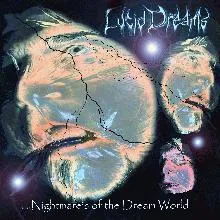
Lucid Dreams
Dark ambient,experimental,industrial
2
top 50
6
songs
4.1K
plays

Release the Dead Release the Dead
Evil/dark ambient track composed & mixed by donhead Guest artist's : m.cole,international garbageman,omnitechnomatrix,~peelspeed & earhox

Death Angel Death Angel
Very dark with hellish mindwarped sound images. Composed & mixed by donnie craig a.k.a donhead Guest artist's include:Bryan Baker,~peelspeed & bev atanton

Synthetic Field Synthetic Field
Original song by thomas from "mystified" remixed by donhead ,Samples added by Donhead.. Extra sounds & demon vox by:peelspeed

Souls of the flesh Souls of the flesh
Mind draining trance mix with some very twisted samples...... composed & mixed by donhead

Becoming the Dream Becoming the Dream
Mind Warping soundscapes with trancy synth's. Mixed & composed by donhead Guest artist's :Hinc,~peelspeed,Chris phinney(distort drum) & shazbot.
Show all (6)
Lucid dreaming is dreaming while being aware you are dreaming. Lucid dreaming is usually induced by some sort of cue--something that indicates to the person that what they are experiencing is a dream, and not reality. Cues, however, are not necessary for becoming lucid: sometimes people become lucid without noticing anything strange or typical of dreams, they just spontaneously realize they are dreaming.Being able to freely control your dreams doesn't directly follow becoming lucid. Lucid dreaming was defined as becoming aware you are dreaming; the actual level of awareness varies, however. When the level of lucidity is high, you are well aware that nothing you experience is real, and you have nothing to fear--you cannot be harmed by any situations that may seem dangerous. With low-level lucidity, although partially aware you are dreaming, you are not aware enough to have a great impact on your dream--you may accept some aspects of your dream that you would not normally accept in the ordinary world (you may not find it at all strange that you dog flies around the living room, etc.) With low-level lucidity, your realization may also fade and you may accept the whole dream as reality.
Even with high-level lucidity, it may not be possible to exert much control over your dreams--at least, at first. Although experience does play a part in how well you can control your dreams, your own belief and confidence is key. If you lack confidence in your dreams, you may fail at controlling them; if you believe in a dream that you cannot do something, it is very likely that you won't be able to.
However, instead of changing the dream, you could merely control your own behaviour. This kind of dream control is most beneficial during nightmares. Rather than attempting to change the dream, you can merely change your own attitude. By realizing it is merely a dream and that you cannot sustain physical damage, you can calm your fear, which is the only real part of the nightmare. Changing your attitude in such a manner usually transforms the nightmare into something more hateful as wellBand/artist history
Lucid dreams was thought up from a nightmare i had ...on a cold,dark black night sometime in the year 1847.Have you performed in front of an audience?Not at this time...I am traped in a area where such music does not get gig's.(fucking muncie,indiana)
Your musical influences
Skinny puppy,Robert rich,Puncture,Necrophagia,ministry,Autumm tear's,endura,koan & nightmare lodgeWhat equipment do you use?
Computer's,samples,keyboard's,drum machine's,mic's & editing software.Anything else?
Everyone dreams at night. Those who claim they don't, simply do not remember their dreams. Having excellent dream recall is absolutely necessary to have frequent lucid dreams (see Is Lucid Dreaming Learnable?). Lucid dreams are usually induced by cues. If you don't remember your dreams, you won't be able to study them to determine your personal cues or dream signs--reoccurring signs that are typical of your dreams. Of course, if you don't remember your dreams, you can have a lucid dream during the night and completely forget it in the morning! You may have already experienced a lucid dream, and just don't know it because you have forgotten it during the course of the night.
The first step to developing your dream recall is getting plenty of sleep. When you're well rested, it will be easier for you to focus on your intent of recalling dreams when falling asleep. Also, if you're able to get plenty of sleep during the night, you won't mind taking some time during the night to record your dreams--and that's exactly what you'll have to do. Finally, the REM periods of sleep get longer during the latter hours of sleep; thus sleeping for longer periods will give you more of an opportunity to awaken from your dreams and remember them.
You won't be able to adequately develop your dream recall if you just plan on going through everything you remember dreaming upon waking up in the morning. During the course of the night, you have many different dreams--at least one per REM period of sleep. The brain seems to erase the previous dream during the intermediate stages between REM periods. Thus, to remember your dreams, you will need to wake up during the REM period. A couple ways of accomplishing this will be discussed here. The easiest is simply to set your alarm clock for 90 minute periods. Aiming for the latter REM periods (about 4.5, 6, or 7.5 hours into sleep) is best because those are the longest dream periods. A similar method is to drink a lot of water before going to bed, which is self-explanatory.
However, to be able to eventually control your dreams, you're going to have to focus your intent on doing so. Therefore a better method of recalling your dreams is focusing your intent on remembering them before falling asleep, as this will prepare you for controlling your dreams later on. As silly as this may sound, you just need to talk yourself into remembering your dreams; I've done this and I can say with certainty that it works. Tell yourself you're going to remember your dreams, just before you lay down. Really focus your intent on that; imagine yourself waking up, turning on a lamp (or flashlight), and recording your dreams. As you fall asleep, remind yourself of your intent: "I will awake from my dreams, and completely remember them." If you find your mind wondering as you drift off, again remember your intent. You want the last thought before drifting off to sleep to be of your intent to awaken from your dreams.
As mentioned in the previous paragraph, you need to record your dreams upon awakening from them. No matter how clear they seem upon waking, you'll have almost completely forgotten them when you again awake in the morning. Keep a dream journal beside the bed (any writing pad will do.) Upon waking, don't allow your mind to drift; immediately attempt to focus on what you had just been dreaming, and write it down in your dream journal. At 4:00am you're probably not going to be in the mood to write a lengthy story about your dream; instead, write down key points, such as what you were doing, where you were, and who was around you. Also, note anything strange--anything that wouldn't normally happen in the waking world. If you find these strange events reoccur in your dreams, then they are your personal dream signs--you will be able to use them to induce lucid dreams, eventually. Before attempting to induce lucid dreams, you should be able to recall at least one dream a night.
muncie,
USA
ID
126445
Contact
Please sign up or log in to contact the artist.
Sign up
Log in
Promoted
Not related to artist